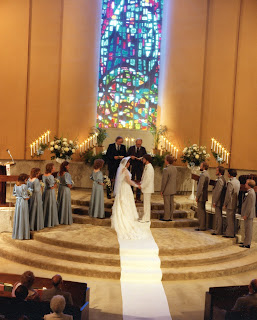What are the Possibilities of Marriage?
Twenty nine years ago in a church in Pasadena, CA, Cheryl and I became husband and wife. It’s been a great journey. Like any marriage we’ve had our ups and downs. Any relationship of value will have its challenges, and we’ll be tempted to walk away on more than one occasion. Perhaps it’s because my own parents were divorced that I’m sensitive to the challenges, and have a desire to make things work.
Marriage is a social construct that binds people together. In our culture we believe that we should marry for love, but in many cultures marriage has more to do with economics and social cohesion. Families will often choose the mates for their children. In our culture that’s seen as unseemly, but it seems to work just as well as our own ways of doing things.
Even in our culture marriage has an economic component. There are financial benefits to marriage, and the culture sees fit to give its blessings to marriage as a civil order, one that clergy often participate in by signing the certificate (remember the state doesn’t care what you say in the wedding, they’re just concerned that the signatures are legally binding!).
Marriage is also seen as a sacred covenant. We have wedding ceremonies in sacred spaces and officiated at by clergy because we seek God’s blessing on this relationship. A phrase that often appears in wedding ceremonies states in form or another something like “What God has joined together, let no one separate.” A church wedding is no talisman or guarantee of success. You have to work at it, but that blessing seems to be important to many, even in this age where religious institutions are seen as irrelevant to a growing number of people. Divorce is a common experience for many in our culture, including many in the church. This reality has forced the church to adapt, but that’s a topic for another day.
In this culture, even today, we seem to believe that marriage is an important guarantor of social stability. It binds people together and seems to offer a sense of permanence, especially among children. Consider the announcement a few months back by Angelina Jolie and Brad Pitt that they would after many years together be getting married – not because they saw it necessary for their own relationship, but because their children requested it. They needed the permanence that a piece of paper seemed to imply.
We are, I believe, as human beings inherently social. It’s true that some among us prefer to be alone, but for most of us, the observation God makes in Genesis 2 is pertinent. After God created the man, God discovered that the man was lonely. Not even the relationship with God was sufficient – the man needed company. So God creates the animals and brings them to him, and the man names them. But in the end, none of these creations fill the need the man feels. Finally, God takes a rib and fashions from it the woman, whom the man recognizes as being bone of his bone, flesh of his flesh. This recognition of oneness is seen as the foundation for marriage. In fact, the text continues: “Therefore a man leaves his father and his mother and clings to his wife, and they become one flesh” (Genesis 2:24 NRSV).
If we are created to be in relationship, and there is a sacred bond that links us together and undergirds family – something even our tax code recognizes – can we not extend this blessing beyond husband and wife? Although male-female marriage has been normative in our society, is it the only way in which can understand this “institution”? If we believe that marriage is important to providing for a sense of permanence in relationships, and that is permanence is important for our culture, would we, a s a society, not be better off if we extended the benefits and blessings that Cheryl and I have accrued over twenty-nine years to same-sex couples? If it is not good for us to be alone, and marriage is a creation of God to bring people into relationship, and some people are wired with an attraction toward persons of the same gender, wouldn’t our society benefit by giving them this same blessing?
Reposted from Troy Patch.

Comments
Marriage is one thing only: the union of an eligible man and an eligible woman. That is all. It cannot be anything else. There can be no marriage without both a husband and a wife. A husband must be a man and a wife must be a woman.
Can you show me where in the Bible God ever endorsed polygamy, or same-sex marriage, or homosexuality?